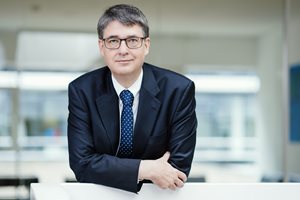Jens Overgaard Legacy Award
Saturday, May 3 | 14:40 - 15:05 | Plenary Hall
Interview with Michael Baumann,
recipient of the Jens Overgaard Award at ESTRO 2025

Michael Baumann – German Cancer Research Center (DKFZ), Heidelberg, Germany
What have been the highlights of your career?
My doctoral thesis, conducted under the guidance of Hans-Peter Beck-Bornholdt and Horst Jung in Hamburg, along with my postdoctoral period at the Department of Radiation Medicine at Massachusetts General Hospital in Boston under the mentorship of Dr. Herman D. Suit, were undoubtedly the defining highlights of my early career. Later milestones included establishing my own independent laboratories for translational radiation oncology in Hamburg and subsequently in Dresden, taking on my first clinical leadership role in head and neck and thoracic radiation oncology in Dresden, and founding both the OncoRay Research Center and the Comprehensive Cancer Center in Dresden. Another particularly meaningful moment for me was the launch of the proton radiotherapy facility in Dresden—a truly special day in my professional journey.
What is your next challenge?
Since the end of 2016, I have served as Scientific Director and CEO of the German Cancer Research Center (DKFZ), one of the largest cancer research institutions in the world. In this role, I oversee a broad nationally funded program that spans the entire cancer research continuum—from fundamental cancer biology, prevention, and early detection, to the development of more effective diagnostics and therapies, and on to implementation science and health economics research. A central challenge is maintaining an optimal balance: fostering a vibrant research ecosystem with sufficient funding and freedom for curiosity-driven basic research, while simultaneously enhancing translational coherence to enable innovative clinical and prevention trials. A concrete and pressing task is the completion of ongoing international scientific and strategic peer reviews of our programs, which are essential to securing sustained funding for cancer research in Germany in the years ahead.
What do you think are the next challenges in your field?
I believe that improving global access to radiotherapy—a highly effective modality for cancer treatment—is the most urgent and formidable challenge facing our field in the coming years. With a steep rise in cancer cases expected, particularly in low- and middle-income countries where radiotherapy resources remain limited, addressing this gap is critical. Efforts must go beyond simply increasing the number of treatment machines; they must also focus on training skilled professionals and ensuring the responsible implementation of innovations. These include AI-enhanced treatment planning and prescription, as well as remote assistance to share expertise and help overcome current workforce shortages.
What does the award mean to you?
Jens Overgaard was first a mentor to me, and in time, became a close friend. ESTRO has always been my professional family, and The Green Journal remains, to me, the most compelling international publication in our field. So, what could be more meaningful than receiving the Jens Overgaard Legacy Award—established to honor his legacy as Editor-in-Chief of Radiotherapy & Oncology—during an ESTRO Annual Meeting?
What has been your involvement within ESTRO?
I have strong connection to ESTRO ever since returning from the United States in the late 1980s. Some of the highlights of my involvement include serving as a teacher on the Basic Radiobiology Course, Chair of the Education and Training Committee, President of ESTRO, and Editor-in-Chief of The Green Journal.
To whom would you like to dedicate your award?
To all of my teachers and mentors, my colleagues and students, and – foremost, to my wife Bettina, who has always supported me throughout every stage of my career, while simultaneously building a remarkable career of her own.